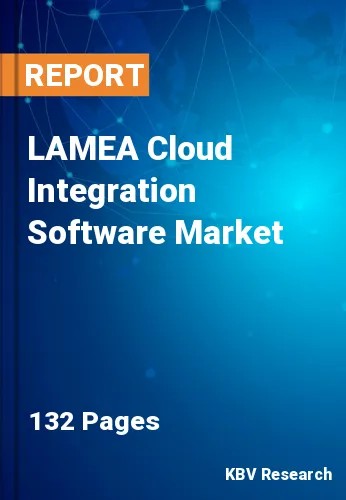The Latin America, Middle East and Africa Cloud Integration Software Market would witness market growth of 16.0% CAGR during the forecast period (2023-2030).
Containerization and microservices architectures are becoming mainstream in application development. Cloud integration software is adapting to these trends by providing support for containerized deployments and facilitating the seamless integration of microservices. With the advancement of hybrid and multi-cloud environments, integration solutions are evolving to provide robust support for connecting applications and data across diverse cloud platforms. This flexibility is essential for organizations seeking to avoid vendor lock-in and optimize resource utilization.
As data integration becomes more critical, the focus on security is intensifying. Its vendors incorporate advanced security attributes such as encryption, individuality and access management, and threat detection to safeguard data during transit and at rest. It progressively embraces low-code and no-code development methodologies in response to the growing demand for enhanced accessibility. This empowers business users and citizen integrators to create and manage integrations with minimal coding, accelerating the pace of integration projects.
The democratization of integration is a notable trend driving the expansion of the market. Traditional integration solutions often require specialized expertise in coding and development. However, the rise of low-code and no-code development approaches is ushering in a new era where business users and citizen integrators can actively participate in the integration process. Low-code and no-code integration platforms empower users with intuitive visual interfaces, pre-built connectors, and drag-and-drop functionalities. This democratization accelerates the pace of integration projects and broadens the scope of integration across different business units within an organization. The result is a more agile and responsive approach to meeting evolving business requirements.
As per the International Trade Administration, Saudi Arabia's e-commerce channel is primed for continued expansion. By 2024, the number of Saudi internet users for e-commerce is anticipated to be 33.6 million, an increase of 42% from 2019. Saudi Arabia boasts one of the world's highest smartphone penetration rates (97 percent). With the proliferation of smartphones, businesses and organizations develop mobile apps to achieve and engage with their audience. Cloud integration enables the seamless integration of these mobile applications with backend systems, databases, and other services. As a result, these aspects will boost the market growth in the coming years.
The Brazil market dominated the LAMEA Cloud Integration Software Market, By Country in 2022, and would continue to be a dominant market till 2030; thereby, achieving a market value of $211.6 million by 2030. The Argentina market is showcasing a CAGR of 16.7% during (2023 - 2030). Additionally, The UAE market would register a CAGR of 15.7% during (2023 - 2030).
Based on Type, the market is segmented into Infrastructure as a Service (IaaS), Software as a Service (SaaS), and Platform as a Service (PaaS). Based on Enterprise Size, the market is segmented into Large Enterprises, and Small & Medium-sized Enterprises. Based on End Use, the market is segmented into IT & Telecommunication, Manufacturing, Retail & E-commerce, BFSI, Healthcare, and Others. Based on countries, the market is segmented into Brazil, Argentina, UAE, Saudi Arabia, South Africa, Nigeria, and Rest of LAMEA.
Free Valuable Insights: The Worldwide Cloud Integration Software Market is Projected to reach USD 9.1 Billion by 2030, at a CAGR of 14.3%
The market research report covers the analysis of key stake holders of the market. Key companies profiled in the report include Salesforce, Inc., IBM Corporation, Microsoft Corporation, Amazon Web Services, Inc. (Amazon.Com, Inc.), Citrix Systems, Inc. (Cloud Software Group, Inc.), Oracle Corporation, Informatica Inc., Verizon Communications, Inc., VMware, Inc. (Broadcom Inc.), and DXC Technology Company
By Type
By Enterprise Size
By End Use
By Country
Our team of dedicated experts can provide you with attractive expansion opportunities for your business.

